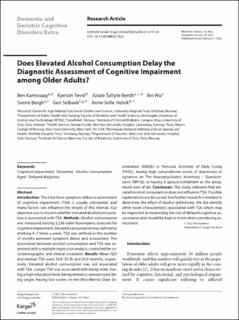| dc.contributor.author | Kamsvaag, Ben | |
| dc.contributor.author | Tevik, Kjerstin Elisabeth | |
| dc.contributor.author | Saltyte Benth, Jurate | |
| dc.contributor.author | Wu, Bei | |
| dc.contributor.author | Bergh, Sverre | |
| dc.contributor.author | Selbæk, Geir | |
| dc.contributor.author | Helvik, Anne-Sofie | |
| dc.date.accessioned | 2022-11-18T07:29:32Z | |
| dc.date.available | 2022-11-18T07:29:32Z | |
| dc.date.created | 2022-02-21T14:22:54Z | |
| dc.date.issued | 2022 | |
| dc.identifier.citation | Dementia and Geriatric Cognitive Disorders Extra. 2022, 12 (1), 14-23. | en_US |
| dc.identifier.issn | 1664-5464 | |
| dc.identifier.uri | https://hdl.handle.net/11250/3032689 | |
| dc.description.abstract | Introduction: The time from symptom debut to assessment of cognitive impairment (TSA) is usually substantial, and many factors can influence the length of this interval. Our objective was to discern whether elevated alcohol consumption is associated with TSA. Methods: Alcohol consumption was measured among 3,236 older Norwegians assessed for cognitive impairment. Elevated consumption was defined as drinking 4–7 times a week. TSA was defined as the number of months between symptom debut and assessment. The association between alcohol consumption and TSA was examined with a multiple regression analysis controlled for sociodemographic and clinical covariates. Results: Mean (SD) and median TSA were 34.8 (35.8) and 24.0 months, respectively. Elevated alcohol consumption was not associated with TSA. Longer TSA was associated with being male, having a high education level, being retired or unemployed, being single, having low scores on the Mini-Mental State Examination (MMSE) or Personal Activities of Daily Living (PADL), having high subsyndrome scores of depression or agitation on The Neuropsychiatric Inventory – Questionnaire (NPI-Q), or having a spouse/cohabitant as the designated next of kin. Conclusion: This study indicates that elevated alcohol consumption does not influence TSA. Possible explanations are discussed, but further research is needed to determine the effect of alcohol definitively. We did identify other novel characteristics associated with TSA which may be important in minimizing the risk of delayed cognitive assessments and should be kept in mind when considering assessment. | en_US |
| dc.language.iso | eng | en_US |
| dc.publisher | Karger International | en_US |
| dc.rights | Navngivelse-Ikkekommersiell 4.0 Internasjonal | * |
| dc.rights.uri | http://creativecommons.org/licenses/by-nc/4.0/deed.no | * |
| dc.title | Does Elevated Alcohol Consumption Delay the Diagnostic Assessment of Cognitive Impairment among Older Adults? | en_US |
| dc.title.alternative | Does Elevated Alcohol Consumption Delay the Diagnostic Assessment of Cognitive Impairment among Older Adults? | en_US |
| dc.type | Peer reviewed | en_US |
| dc.type | Journal article | en_US |
| dc.description.version | publishedVersion | en_US |
| dc.source.pagenumber | 14-23 | en_US |
| dc.source.volume | 12 | en_US |
| dc.source.journal | Dementia and Geriatric Cognitive Disorders Extra | en_US |
| dc.source.issue | 1 | en_US |
| dc.identifier.doi | 10.1159/000521924 | |
| dc.identifier.cristin | 2004155 | |
| cristin.ispublished | true | |
| cristin.fulltext | original | |
| cristin.qualitycode | 1 | |

